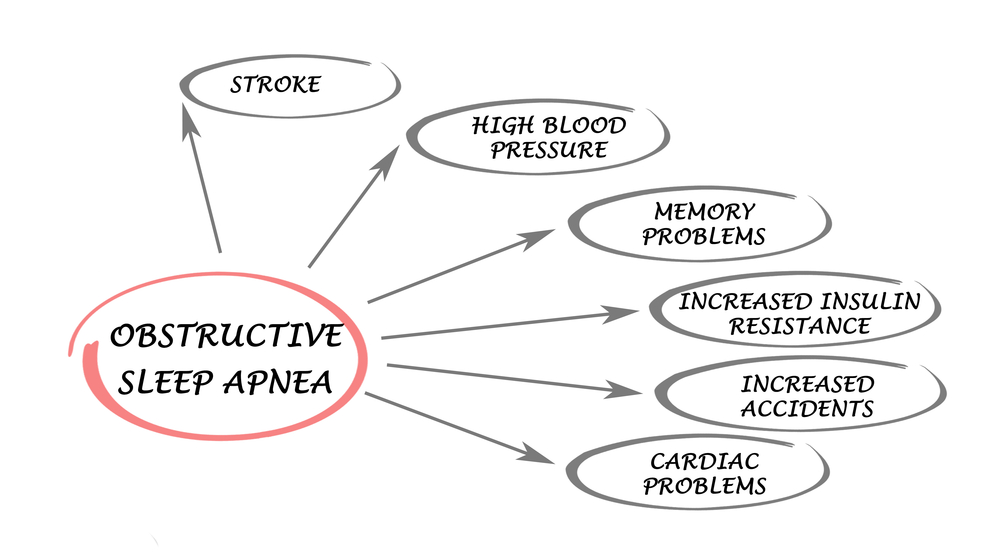What Exactly Is It?
The hallmark of sleep apnea is the frequent starting and stopping of your breathing while sleeping. These interruptions often occur without your realizing they are happening.
Your sleep is interrupted, and your oxygen levels drop as your breathing ceases.
Most concerning is the fact that you may not know this is happening. Often it is the bed partner who recognizes this issue. Excessive snoring is a frequent symptom, and your partner will undoubtedly notice this. It’s also likely they will witness you stop breathing which is usually a cause for great concern.
The Three Types
Obstructive Sleep Apnea (OSA) is most prevalent, affecting approximately 25% of men and nearly 10% of women. OSA results from the muscles in the back of your throat relaxing and narrowing the airway as you try to breathe.
Central Sleep Apnea occurs when the brain fails to deliver signals to engage the appropriate muscles for breathing. Unable to breathe for short periods of time, your sleep is disturbed frequently throughout the night.
Complex Sleep Apnea is a hybrid form of sleep apnea encompassing Obstructive and Central Sleep Apnea, often referred to as Treatment-Emergent Central Sleep Apnea.
Although distinctly different, each diagnosis delivers the same unpleasant and unhealthy symptoms. Left undiagnosed or untreated, each has the potential for multiple severe health consequences.
What Are the Risk Factors?
There are many indications for developing sleep apnea. While unhealthy lifestyle choices are prevalent in the list, genetics and family histories also play a significant role.
Here are some of the most frequent and apparent culprits.
- Excess Weight
Overweight individuals risk developing obstructive sleep apnea as extra tissue of weight gain can also restrict your airways. Often, successfully losing unwanted pounds can alleviate or even eliminate OSA. - Owning a Thick Neck
We don’t get to choose our physical characteristics at birth. Some of us arrive with physical features, like a thick neck structure, that naturally have the potential for a narrower airway and developing Sleep Apnea. - Your Family History
When Sleep Apnea is present in your family tree, you have a greater chance of developing this condition. - Medical Issues
Medical conditions like high blood pressure, type II diabetes, congestive heart failure, and Parkinson’s disease can also lead to developing Sleep Apnea. - Congestion
Ongoing difficulty breathing at night due to nasal congestion often facilitates the development of OSA. - Smoking
Smokers have a three times greater chance of developing Obstructive Sleep Apnea than non-smokers, as smoking causes the body to retain fluids in the airway. - Alcohol
Sedatives like alcohol can relax the muscles in your throat, increasing your risk and making OSA even worse. - Aging
As we age, conditions such as sleep apnea become more common. Growing older does not indicate the disease, but it does significantly increase the risk of developing sleep apnea.
In all its forms, sleep apnea is a complex condition that can develop for many reasons. Understanding if and how these known risk factors might be impacting your health can be helpful if you believe you are suffering from this disorder.
What Can You Do?
A Continuous Positive Airway Pressure device called a CPAP machine is the primary solution to prevent breathing disruptions. These devices deliver a constant stream of conditioned air at a specific pressure to help keep your airway open.
The system employs a hose connecting the machine to a fitted mask to deliver the CPAP’s airflow consistently and effectively to the patient’s airway.
While the CPAP technology represents the standard of care for this disease, there are lifestyle changes that can also help alleviate this condition.
Losing some weight may be helpful if that is your issue. Getting more physical activity is always a net positive for our physical health. Better muscle tone, improved cardiovascular health, increased lung capacity, and other benefits of adequate exercise are all helpful improvements to your well-being.
Minimizing or eliminating the use of alcohol, tobacco, and any other risky health behavior can also help significantly.
Final Thoughts
Sleep Apnea is a serious medical issue that can lead to severe health consequences and even death. Alarmingly, people suffering from this condition are often unaware, and a substantial portion of them remain undiagnosed and untreated.
Absent treatment, the lack of oxygen, and loss of sleep will have far-reaching consequences that negatively impact the quality and duration of life. Professional medical intervention and CPAP therapy are crucial to protect your health.
Sleep Science Academy’s professional sleep coaches and specialized program create an effective alliance with your medical treatment to help you overcome your sleep challenges.
The techniques and insights you gain from your Sleep Science Academy experience will augment the results of medical treatments, providing sleep strategies and tools you can use going forward.
We are here to help you live better by sleeping better. Contact us today for your free consultation and learn more about fighting back against OSA.

